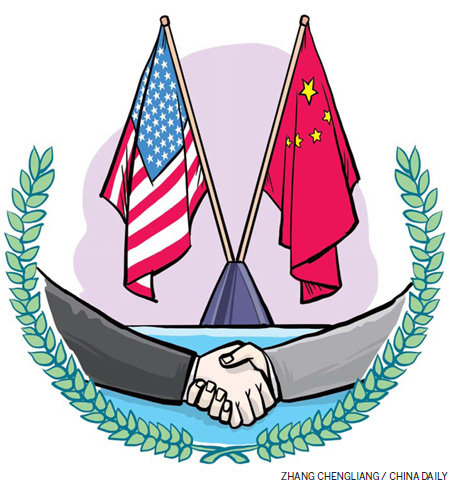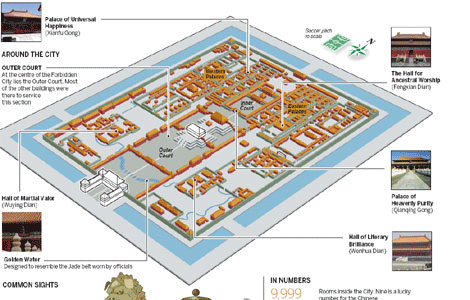Web Comments
Better a friend than an enemy
Updated: 2011-09-09 08:39
By Zhao Chu (China Daily)

Stereotypes need to be set aside so that the world can build a future free from the scourge of war
Over the past decade perhaps the most sensitive question for those interested in Sino-US relations has been whether China is going to have to be an enemy of the US.
Even though presidents of the two countries have repeatedly emphasized the necessity of Sino-US cooperation, some argue from different perspectives - be it in US congressional hearings or in the Chinese media - that China will probably be the next global opponent of the US. But, is that true?
According to a Gallup poll published in 2008, in the eyes of most US people, China had replaced the Democratic People's Republic of Korea as the third biggest enemy of the US. Media in the US report widely about China's global economic development plans and its formidable weaponry expansion, ranging from stealth fighters, anti-satellite missiles and aircraft carriers. US columnists and members of Congress alike portray China as an immediate adversary.
At the same time some Chinese scholars keep talking about a US containment strategy for China. They have built their arguments on increasing trade disputes and US military deployments in the western Pacific.
Those Americans and Chinese who treat each other as enemies all have their own reasons, but I think their arguments are far from being rational or insightful.
After the Cold War the US and China suddenly lost their chief common target. They then changed their priorities: the US was soon involved in wars in Afghanistan and Iraq, and China was achieving its most impressive economic growth since 1949.
At the same time, China tried to translate its economic capacity into some sort of military power to meet its reasonable defense needs.
Over that time the lack of a strategic dialogue platform has raised new doubts on each other's ability and intentions, even if ties between China and the US have continued to develop. People overlook the two countries' effective cooperation in the past and exaggerate potential dangers in the future.
I think China has no reason to challenge US military hegemony. The US has a fleet of 11 nuclear-powered advanced aircraft carriers and new-generation stealth fighters including F-22A and F-35 in service; as for China, things are still in an early experimental phase.
But the US government should be aware that China will never hesitate to defend its core national interests by all means. This subtle balance of capacity and determination argues for both countries to explore a future where everyone wins.
Thus we have witnessed an increase in exchanges and dialogue between presidents, ministers and senior officials. The annual Sino-US Strategic and Economic Dialogue covers a wide range of issues, from global and regional crises to bilateral issues in all their aspects.
Those who believe in a gloomy future of Sino-US relations have stereotypically put a rising China in the context of the Cold War. And they ignore the critical fact that over 40 years the strategic cooperation between China and the US has had an important impact on both sides, even if there have been conflicts from time to time.
When President Richard Nixon and Chairman Mao Zedong shook hands in 1972 the strategic balance of the bipolar world began to change. That has given China the needed international environment for its reform and opening-up.
The US and China have developed a vast area of mutual economic interests in the post-Cold War era. The Sino-US relationship is critical to the world, a relationship that cannot be allowed to fail.
Anyone who considers the number of planes and ships packed with people and goods traveling between the east and west banks of the Pacific could not but conclude that this is a golden time for China, the US and the world at large.
The two largest economies have become interconnected as never before. In addition, China has proved itself an indispensable partner to the US in global and regional issues. While these close ties present opportunities for more cooperation between the two, they also provoke new doubts in many. What, they ask, are the ultimate aims of both countries.
People of the two countries, particularly younger people in China growing up in an ever changing world, can barely imagine a constructive relationship between world powers. Their sole reference points are the terrible conflicts that have bloodied world history for the past several hundred years.
Even some of those able to grasp how fundamentally the world has changed do not readily understand that issues such as climate change, environmental protection financial crises and the threat of global terrorism are challenges that no one country alone, be it China or anyone else, can tackle.
Only by working together can China and the US help shape a better world.
If Americans look at Chinese history of the past 160 years it will become clear to them how the Chinese people and their government plan to use their newly gained tools. There will be no pursuit of world dominance, or of challenging the super power; the goal is simply to tackle the mountains of problems that China faces. Those problems include the remnants of poverty as well as others that are the inevitable results of rapid modernization.
It is clear that to solve these vexing problems or to achieve a huge transformation, a stable and cooperative Sino-US relation is needed as never before. The solutions will even include some that Americans themselves have used.
In an era of globalization, none of the two countries can pretend to neglect the reality and neglect each other. More than 3 million Chinese live in the US; many are US citizens who have relatives in China. As US people crave for Apple's latest iPhones they are being manufactured day and night in factories in Shenzhen.
The Americans and the Chinese will no doubt have their difficulties in the years to come, and there may be some fierce disputes, but in a much smaller world we are bound to build a candid and constructive friendship.
The author is the deputy director of Shanghai International Peace Institute. The opinions expressed in this article do not necessarily reflect those of China Daily.
E-paper

Unveiling hidden treasures
The Forbidden City, after the Great Wall, is the most recognized tourist site in China.
Short and sweet
Game for growth
Character reference
Specials

China at her fingertips
Veteran US-China relations expert says bilateral ties have withstood the test of time

The myth buster
An outsider's look at china's leaders is updated and expanded

China in vogue
How Country captured the fascination of the world's most powerful fashion player
